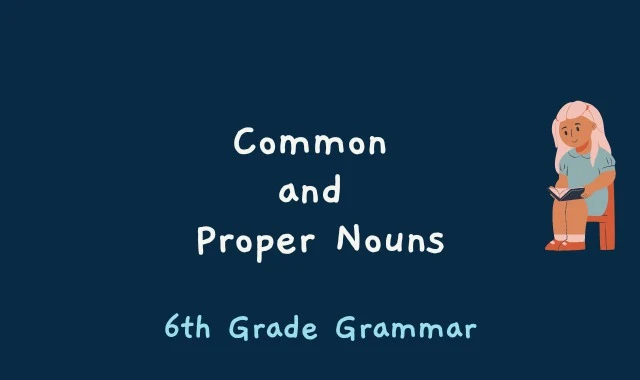Common and Proper Nouns - 6th Grade Grammar
Introduction
Welcome to the insightful world of grammar where we delve into the pivotal elements of 6th Grade English: Common and Proper Nouns. This article is designed to illuminate the fundamental differences between these two types of nouns, a cornerstone concept in grammar. Understanding common nouns, the general names for people, places, things, or ideas, and proper nouns, which specifically identify names of individuals, places, or organizations, is crucial for developing strong writing and communication skills. We will explore examples, rules for capitalization, and the nuances that distinguish these nouns, providing a comprehensive guide for students and educators alike. Whether you're a budding writer, a grammar enthusiast, or a student preparing for your next English exam, this article is your go-to resource for mastering common and proper nouns in 6th Grade Grammar.
Common and Proper Nouns
What is a common noun?
Examples:
scientist
restaurant
hammer
opinion
The professor pointed to the country on the map. (common nouns)
<->
What is a proper noun?
A proper noun names a specific person, place, thing, or idea. It is capitalized.
Examples:
Clara Barton,
The Library of Congress
Friday
Fourth of July
Dr. Aya located Brazil in The Explorer’s Atlas. (proper nouns)
Examples:
Clara Barton,
The Library of Congress
Friday
Fourth of July
Dr. Aya located Brazil in The Explorer’s Atlas. (proper nouns)
Common and Proper Nouns Activity
Identify the underlined word in each sentence as a proper or common noun.
Common and Proper Nouns Quizizz Quiz for 6th Grade
Conclusion
Mastering common and proper nouns is a crucial step in enhancing your grammar and writing skills. By understanding the differences between these two types of nouns, you can improve your sentence structure and clarity. Keep practicing with the provided examples and exercises, and revisit this guide whenever you need a refresher. Remember, consistent practice is key to mastering grammar. Happy learning, and may your use of common and proper nouns always be precise and impactful!
FAQs
What is a common noun?
Answer: A common noun is a generic label for a class of entities. It refers to general items rather than unique ones.
Can you give examples of proper nouns?
Answer: Proper nouns are specific identifiers. For instance, 'London', 'Elizabeth', and 'Mount Everest' are proper nouns.
How do I identify a proper noun in a sentence?
Answer: Proper nouns are typically capitalized and denote specific names of people, places, or organizations.
Why is understanding common and proper nouns important?
Answer: Recognizing these nouns enhances language understanding and aids in proper sentence structuring.
Are proper nouns always capitalized?
Answer: Yes, proper nouns are capitalized to signify their uniqueness in contrast to common nouns.
Can a word be both a common and a proper noun?
Answer: Yes, context determines usage. For example, 'Apple' can be a fruit (common noun) or a company (proper noun).
Do proper nouns have plural forms?
Answer: While less common, proper nouns can be pluralized, especially in cases of family names or when referring to multiple entities with the same name.

